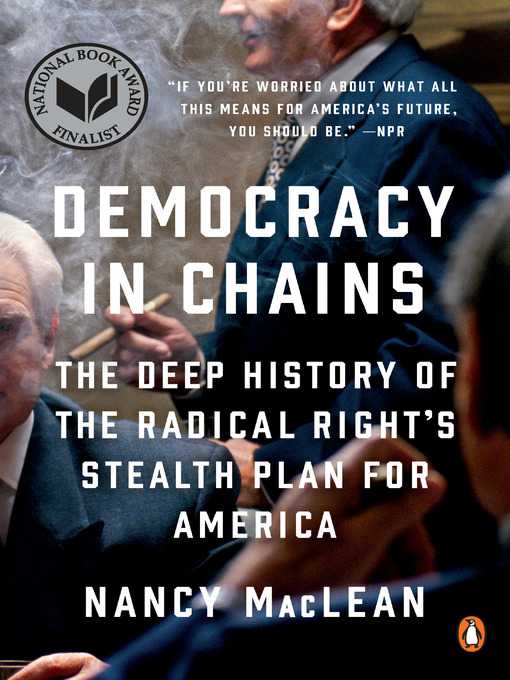
Democracy in Chains
The Deep History of the Radical Right's Stealth Plan for America
کتاب های مرتبط
- اطلاعات
- نقد و بررسی
- دیدگاه کاربران
نقد و بررسی

Starred review from April 10, 2017
MacLean (Freedom Is Not Enough) constructs an erudite, searing portrait of how the late political economist James McGill Buchanan (1919–2013) and his deep-pocketed conservative allies have reshaped—and undermined—American democracy. MacLean makes the convincing argument that an American “paloecapitalist” elite has sought to destroy our institutions in pursuit of their own “economic liberty.” Focusing on Buchanan, winner of the 1986 Noble Prize in Economics and mastermind behind public choice theory, MacLean traces his career and influence, including over former Virginia governor Harry Byrd and Chile’s former military ruler, Augusto Pinochet. In a thoroughly researched and gripping narrative, she exposes how Buchanan’s strategies shaped trends in government in favor of “corporate dominance” and against the welfare state. His theories, according to MacLean, influenced the push for privatizing education. Moreover, the cadre of wealthy libertarians he inspired still persists in contemporary politics. MacLean examines the reach of this powerful group and its think tanks, such as Charles Koch’s Cato Institute and the Heritage Foundation. She has delivered another deeply important book that will interest general readers and scholars alike. Her work here is a feat of American intellectual and political history. Agent: Susan Rabiner, Susan Rabiner Literary.

May 1, 2017
How American democracy is being destroyed by powerful libertarians.Focusing on Nobel Prize-winning economist James McGill Buchanan (1919-2013), whom Charles Koch funded and championed, MacLean (History and Public Policy/Duke Univ.; The American Women's Movement, 1945-2000: A Brief History with Documents, 2008, etc.) elaborates on the revelations about the Koch brothers' insidious, dangerous manipulation of American politics that has been presented forcefully by Jane Mayer in Dark Money (2016) and Daniel Schulman in Sons of Wichita (2014). Based on Buchanan's papers as well as published sources, MacLean creates a chilling portrait of an arrogant, uncompromising, and unforgiving man, stolid in his mission to "save capitalism from democracy." To Charles Koch, he seemed a kindred spirit. Buchanan believed that growth of government undermines individual freedom. Government overreach, he maintained, included public schools, the Postal Service, prisons, labor laws, Social Security, Medicare, Medicaid for the poor, guarantees of voting rights, foreign aid, the Environmental Protection Agency, and the graduated income tax. Government's only role, Buchanan and his followers believe, "is to ensure the rule of law, guarantee social order, and provide for the national defense." MacLean traces Buchanan's career at several universities--the last was the fledging George Mason, which the Wall Street Journal called "the Pentagon of conservative academia"--where he reigned over his own economics institutes, backed generously by wealthy libertarians; and his embrace by exclusive think tanks, such as the Mont Pelerin Society, the Hoover Institution, the Cato Institute, the Club for Growth, and the Heritage Foundation, among many other Koch-funded organizations. Besides influence at home, Buchanan helped design a constitution for the Chilean dictator Augusto Pinochet, a document that ensured constraint of majority power. MacLean offers a cogent yet disturbing analysis of libertarians' current efforts to rewrite the social contract and manipulate citizens' beliefs--e.g., by spreading "junk pseudo science" about climate change. An unsettling expose of the depth and breadth of the libertarian agenda.
COPYRIGHT(2017) Kirkus Reviews, ALL RIGHTS RESERVED.

September 1, 2016
Duke historian MacLean argues that the Radical Right's agenda goes back to Brown v. Board of Education and subsequent resistance in the South to integration and even further to antebellum South Carolina senator John C. Calhoun's support of the propertied. Tellingly, that support has played into the thinking of Nobel Prize-winning economist James M. Buchanan, in turn influencing the Koch brothers.
Copyright 2016 Library Journal, LLC Used with permission.

























دیدگاه کاربران